Luigi Pirandello LIOL in a new version by Tanya Ronder  NICK HERN BOOKS London www.nickhernbooks.co.uk IntroductionSon of Chaos A poet of human suffering is the phrase theatre professor, Ortolani, uses to describe Luigi Pirandello. He urges us to listen for the agony echoing from within the dramas of Italys enigmatic dramatist. Not a hard ask with most Pirandello plays they scream misery from the page, tell stories of people trapped in their lives or some nether-life where nobody can exit their vexed reality. Not so, however, with Liol. This is Pirandello on vacation. He wrote it in 1916 after a trip home to Sicily.
NICK HERN BOOKS London www.nickhernbooks.co.uk IntroductionSon of Chaos A poet of human suffering is the phrase theatre professor, Ortolani, uses to describe Luigi Pirandello. He urges us to listen for the agony echoing from within the dramas of Italys enigmatic dramatist. Not a hard ask with most Pirandello plays they scream misery from the page, tell stories of people trapped in their lives or some nether-life where nobody can exit their vexed reality. Not so, however, with Liol. This is Pirandello on vacation. He wrote it in 1916 after a trip home to Sicily.
Pirandello describes this play as a comedy full of songs and sunshine so light-hearted it doesnt seem like one of my works and it is uncharacteristically joyful. Yet, light-hearted? He cant shake himself off that easily. The idiosyncratic pain glints brightly beneath the loveliness. Quite apart from the dearth of young men in the world of the play they emigrated in droves from Sicily in that era to escape poverty and seek work further afield and the vivid portrait of the limited lot of women, there is the question of what fired Pirandello to write it. Where did the impulse to create the great Sicilian libertine Liol come from? Local labourer Liol is a single father of three boys, each child the offspring of a different woman. Liol takes full charge of the consequences of his affairs and brings the children up, with his mothers help, uncomplainingly.
He works hard, jokes, sings and clearly enjoys sex. A creation of ultimate fecundity, Liol is at ease with himself and the world around him. Bringing life with him wherever he goes, he is natures force and has a way with women to make your hair curl. Pirandello, on the other hand, didnt manage women so effortlessly. His marriage slid into extended despair as his wifes nervous disposition escalated into madness, and that was not his only foiled relationship. The lightness in Liol articulates an absolute counterpoint to the dogged yearning Pirandello experienced throughout his life.
He longed for a fullness of relations with a number of key women, with all of whom it proved impossible. I write to forget myself, he puts in a letter to Marta Abba, the final subject of his unrequited love. Written at the height of Pirandellos difficulties with his wife, Liol seems to spring out as a form of ideal, the kind of man that Pirandello knew he could never be. Unsurprisingly, the formative pattern of his parents relationship was not the healthiest model. His father, Stefano, cheated on Luigis mother with his niece, no less, with whom he had weekly liaisons in the convent where his sister was prioress. In a short story, Pirandello describes the scene where he, as a youngster, goes and catches them one Sunday.
His father hides behind the green curtain, too short to conceal his feet, while the fourteen-year-old Pirandello spits in his unfaithful cousins face. Pirandellos first love, at the age of fourteen, was Linuccia, another cousin of his. Four years older than him she was a bright, lovely girl who adored him and may well have been his best chance. By the time he was eighteen, they were engaged, but he was self-conscious doing the mating charade in front of family and community and felt inadequate alongside her several more senior admirers. So he left Sicily and Linuccia, with the engagement still in place. From there on in he was confused about his desires and responsibilities.
During this time he had a brief, emancipated liaison whilst studying in Como. He describes the young woman as a mistress of vices and an innkeeper of her body a blueprint for Liol, perhaps. They spent every night together, and he believed she was sincere when she swore to be faithful. But it couldnt sustain, and, whichever of them finished it, Luigi moved his studies to Germany, which marked the end of the affair. In Bonn he met Jenny. She wore a blue mask and straw hat the night they met.
He moved to her parents house as a lodger and befriended the whole family; however, once again a straightforward happiness eluded Pirandello. He was a bird without a nest, as he describes himself later in another letter to Marta. He couldnt balance respect for Jenny with sexual intimacy and ended up leaving that transitory roost abruptly and rudely. He returned to Sicily, filled with guilt and feeling like a stone, to wriggle out of his engagement with Linuccia, an almost unprecedented move in Sicily at that time. Perhaps as a consequence of these premature endings, he gave himself completely to the next proposal his fathers suggestion of marrying shy, nunnery-educated Antoinetta Portulano from Agrigento in Sicily. During their courtship, Luigi wrote her tumbling, impassioned letters.
You are my sun, my peace, my purpose you will love me, you must love me because I, he trails off. His outpourings embarrassed and overwhelmed Antoinetta she didnt know how to respond but the marriage went ahead, and they had a few timid but content years together in which they produced three children. But after a financial disaster in which Pirandellos father lost all their wealth, Antoinetta had a breakdown. It prompted a lifelong journey into violent paranoia. Everything Luigi did exacerbated her condition. It means the failure of any efforts to hide my misery, he wrote of his wifes madness.
Luigi chose to care for Antoinetta at home, hoping for her healing and not wanting to give up their conjugal relationship. It was when Antoinetta finally accused Pirandello of having incestuous relations with their sixteen-year-old daughter, Lietta, that Luigi caved in and sent her to a sanatorium where she remained for forty years, well beyond her husbands death. Lietta, traumatised by her mothers behaviour, went away to convent school, Stefano, his oldest son, was a prisoner-of-war in Austria, so Luigi was left acutely lonely with Fausto, his youngest child, in a near-empty house. A glutton for punishment, he later broke his heart again with an infatuation for the young actress, Marta Abba. Marta became his best friend and muse. She gave him her time, energy and talent, but not her body.
They made work together, travelled, toured he would have followed her in an agony of desire to the ends of the earth. I talk to your picture when I am alone, he confessed to her just as he also used to converse with his dead mother in the depths of his solitude. So for Pirandello for whom the sins of the flesh became and remained a vice inventing the hero Liol, whose every encounter is fertile, must have been liberating. He has the attributes more normally found in the protagonists nemesis, the competition. I laughed out loud at Liols audacity when I first read the play in the British Library. Its the opposite of Don Giovanni, where the rogue male gets his comeuppance and is sent to Hell this rogue gets no such retribution. Far from it, it is Liols new child who will inherit all Uncle Simones money.
With the scattering of his seed, Liol defies convention, religion and law, yet we inwardly cheer when he persuades Mita to break her marriage vows with him because at base level he is wholesome. He represents the natural forces of the world, the earthly systems rather than our man-made frameworks. Hes no deviant but pure nature, as he puts it himself. He is rogue in the sense that he is nobodys pet, theres no flock he follows. He has a clear moral viewpoint: its just not one that society shares. If it was the foiled longing in Pirandello for what he couldnt enjoy that propelled the transgressive Liol onto the page, then it is true to the spirit of the son of chaos, as Pirandello declared himself.
Born in a Sicilian town whose nickname was derived from the Greek
Next page
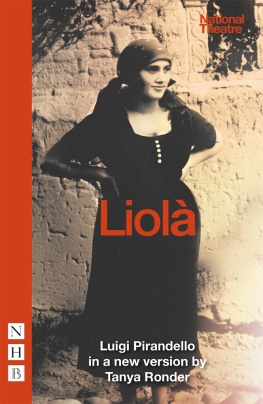
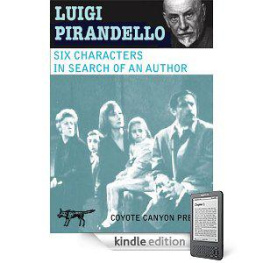


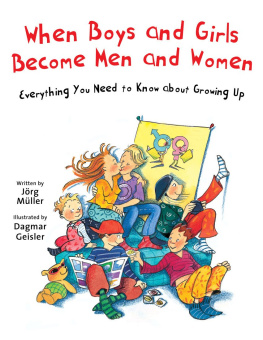
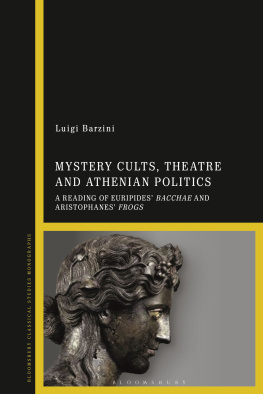
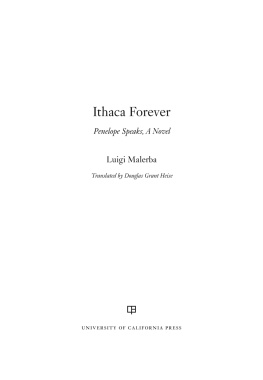
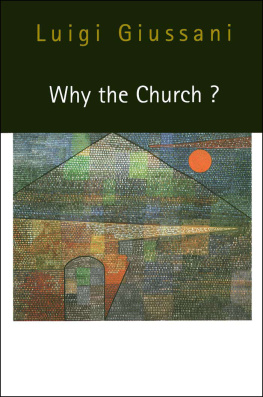

 NICK HERN BOOKS London www.nickhernbooks.co.uk IntroductionSon of Chaos A poet of human suffering is the phrase theatre professor, Ortolani, uses to describe Luigi Pirandello. He urges us to listen for the agony echoing from within the dramas of Italys enigmatic dramatist. Not a hard ask with most Pirandello plays they scream misery from the page, tell stories of people trapped in their lives or some nether-life where nobody can exit their vexed reality. Not so, however, with Liol. This is Pirandello on vacation. He wrote it in 1916 after a trip home to Sicily.
NICK HERN BOOKS London www.nickhernbooks.co.uk IntroductionSon of Chaos A poet of human suffering is the phrase theatre professor, Ortolani, uses to describe Luigi Pirandello. He urges us to listen for the agony echoing from within the dramas of Italys enigmatic dramatist. Not a hard ask with most Pirandello plays they scream misery from the page, tell stories of people trapped in their lives or some nether-life where nobody can exit their vexed reality. Not so, however, with Liol. This is Pirandello on vacation. He wrote it in 1916 after a trip home to Sicily.